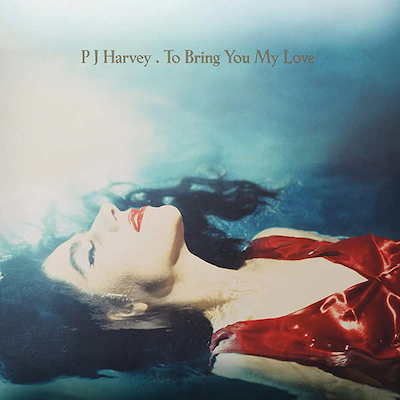1. PJ HarveyTo Bring You My Love

I first listened to this on a Discman sitting at the side of the PE hall with a school-friend who had borrowed the album from the library. I always bunked off PE, and on the particular day that I heard the record, it was netball practice and I was glad to not be a part of it. I was quite a severe self-harmer at the time and so I was allowed off from lessons; I wasn’t put through the trauma of changing in front of the other girls or anything like that, thankfully. Listening to this record was a revelation and a sliding-doors moment for me, because PJ Harvey was the first person I heard who sounded like me. I don’t mean that in an arrogant way like ‘I sing like PJ Harvey,’ far from it! It was as in, my voice was always different.
My school’s music teacher’s husband was an engineer at Maida Vale Studios and our school choir would often go and record stuff there for the BBC. I was always pulled out to do the solos – not because I was the best singer, but because my voice didn’t ‘blend’. I always sang with this quite deep, resonant tone. Hearing this PJ Harvey record was the first time where I’d heard a voice like mine, and it was mind-blowing. It had never occurred to me that you could be a lead singer who sounded like that – I thought you had to sound like Mariah Carey or Whitney Houston or Christina Aguilera – and so it changed all my perceptions of what I could be as a musician. I still get quite emotional thinking about it: here was a voice that could reflect people like me. Nothing had ever hit me that much before.
The other thing about the record that chimed with me especially was her performative femininity where she delivered it with an almost pseudo drag queen style. I was someone who felt really uncomfortable in my own skin at the time. I didn’t consider myself to be attractive in any way; I didn’t really know how to be a woman. Seeing this frail body type that looked like mine with these massive fake eyelashes and blue eyeshadow in a catsuit – it was like, ‘I can do that, I can adopt that!’ and it was like an armour to me where I could be a different version of myself. I guess it was like a really strange, almost drag act version of the female face, which is something that I was already doing myself a little at school already, like wearing incredibly extreme eyeliner almost in quite a consciously unattractive way, wanting to not look conventionally attractive but wanting to look striking. I was drawn to that throughout my university days as well at a time when I was immersing myself in queer club culture too as I tried to figure out my own sexuality.
When I came back to the record, years later, I learned about it being produced by Flood. That then made it a gateway to the John Parish and PJ Harvey collaboration, which in turn influenced the approach to the project I did with Bernard Butler [2020’s In Memory Of My Feelings ]. I discovered this record of course well before streaming existed. I couldn’t afford to buy CDs and so this is where the library came in. We would borrow them but also copy them! As I was a teenager from a working class background with no money – and this was the only way many of us could get our hands on any music at the time. ‘Libraries gave us power’, music, and in my case, PJ Harvey.


